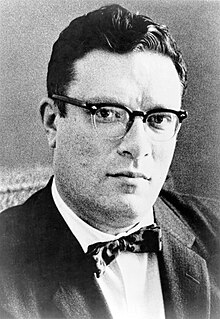I, Robot is a 1950 science fiction fixup novel by Isaac Asimov.
I, Robot, I Robot, or iRobot may also refer to:

I, Robot is a fixup novel of science fiction short stories or essays by American writer Isaac Asimov. The stories originally appeared in the American magazines Super Science Stories and Astounding Science Fiction between 1940 and 1950 and were then compiled into a book for stand-alone publication by Gnome Press in 1950, in an initial edition of 5,000 copies. The stories are woven together by a framing narrative in which the fictional Dr. Susan Calvin tells each story to a reporter in the 21st century. Although the stories can be read separately, they share a theme of the interaction of humans, robots, and morality, and when combined they tell a larger story of Asimov's fictional history of robotics.

Isaac Asimov was an American writer and professor of biochemistry at Boston University. He was known for his works of science fiction and popular science. Asimov was a prolific writer, and wrote or edited more than 500 books. He also wrote an estimated 90,000 letters and postcards.
Nemesis is a Greek mythological spirit of divine retribution against those who succumb to hubris. Nemesis may also refer to:

The Robot series is a series of 37 science fiction short stories and six novels by American writer Isaac Asimov, featuring positronic robots.

The Three Laws of Robotics are a set of rules devised by science fiction author Isaac Asimov. The rules were introduced in his 1942 short story "Runaround", although they had been foreshadowed in some earlier stories. The Three Laws, quoted from the "Handbook of Robotics, 56th Edition, 2058 A.D.", are:

Cory Efram Doctorow is a Canadian-British blogger, journalist, and science fiction author who served as co-editor of the blog Boing Boing. He is an activist in favour of liberalising copyright laws and a proponent of the Creative Commons organization, using some of their licences for his books. Some common themes of his work include digital rights management, file sharing, and post-scarcity economics.
Judgment Day is another name for the Last Judgment in the Abrahamic religions of Judaism, Christianity, and Islam
Nightfall or night fall may refer to:
"Liar!" is a science fiction short story by American writer Isaac Asimov. It first appeared in the May 1941 issue of Astounding Science Fiction and was reprinted in the collections I, Robot (1950) and The Complete Robot (1982). It was Asimov's third published positronic robot story. Although the word "robot" was introduced to the public by Czech writer Karel Čapek in his 1920 play R.U.R., Asimov's story "Liar!" contains the first recorded use of the word "robotics" according to the Oxford English Dictionary. The events of this short story are also mentioned in the novel The Robots of Dawn written by the same author.

Dr. Susan Calvin is a fictional character appearing in Isaac Asimov's Robot series of science fiction short stories. According to I, Robot, Susan Calvin was born in the year 1982 and died at the age of 82, either in 2064 or 2065.
Eando Binder is a pen name used by two mid-20th-century science fiction authors, Earl Andrew Binder (1904–1965) and his brother Otto Binder (1911–1974). The name is derived from their first initials (E and O Binder).
"The Cold Equations" is a science fiction short story by American writer Tom Godwin, first published in Astounding Magazine in August 1954. In 1970, the Science Fiction Writers of America selected it as one of the best science-fiction short stories published before 1965, and it was therefore included in The Science Fiction Hall of Fame, Volume One, 1929–1964. The story has been widely anthologized and dramatized.
A robot is a virtual or mechanical artificial agent, usually an electro-mechanical machine.

"I, Robot" is a science fiction short story by Eando Binder, part of a series about a robot named Adam Link. It was published in the January 1939 issue of Amazing Stories, well before the related and better-known book I, Robot (1950), a collection of short stories, by Isaac Asimov. Asimov was heavily influenced by the Binder short story.

Adam Link is a fictional robot, made in the likeness of a man, who becomes self-aware, and the protagonist of several science fiction short stories written by Eando Binder, the pen name of Earl Andrew Binder and his brother, Otto Binder. The stories were originally published in the science fiction magazine Amazing Stories from 1939 to 1942. In all, ten Adam Link stories were published. In The American Robot: A Cultural History, Dustin A. Abnet says that Adam was the "most popular science fiction robot of the era".
Time Traveler(s) or Time Traveller(s) may refer to:
The Message may refer to:
"I, Robot" is an episode of the original The Outer Limits television show. It first aired on 14 November 1964, during the second season. It was remade under the same title in 1995. Leonard Nimoy appeared in both versions.
References to Isaac Asimov's Three Laws of Robotics have appeared in a wide variety of circumstances. In some cases, other authors have explored the Laws in a serious fashion. Other references, like those made in the satirical newspaper The Onion, are clearly parodic.

Overclocked: Stories of the Future Present is a collection of previously published science fiction short stories and novellas by Cory Doctorow. This is Doctorow's second published collection, following A Place So Foreign and Eight More. Each story includes an introduction by the author.